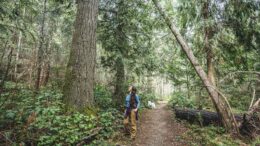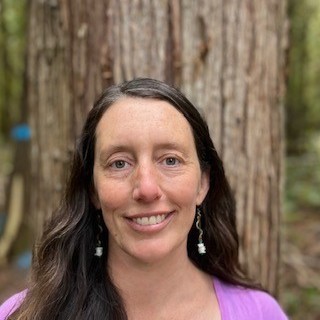The place:
The Elwha watershed in northwestern Washington, near Port Angeles, is approximately 321 square miles. The river’s headwaters originate 6,000 feet above sea level in the Olympic National Park and flow to the Strait of Juan de Fuca, which drains into the Salish Sea before leading to the Pacific Ocean. The river is the site of the biggest dam removal and river restoration in history, with the federal government spending over $327 million to remove the Glines Canyon and Elwha dams and regenerate the river’s surrounding ecosystem. 
Despite that, industrial logging continues in this beloved river valley — in some instances less than 1,000 feet from the river itself.
Why it matters:
The Klallam people have been stewards of the Elwha River and the surrounding area since time immemorial, with the Lower Elwha Klallam Tribe working decades to achieve dam removal and continuing to play a key role in river restoration. Before settlers arrived, Indigenous peoples lived in reciprocity with the Elwha while it nourished their culture and provided food for their families.
As the Elwha River regenerates, it’s a source of hope for many — not only in Washington, but around the world — that dismantling structures of colonization can lead to a more balanced relationship with nature.
Recovering salmon populations have only just reached a level to allow limited ceremonial and subsistence fishing in 2023, after decades of decimation due to the dams.
The watershed’s nonhuman inhabitants, many of whom are threatened or endangered, also depend upon a healthy watershed: marbled murrelets, northern spotted owls, American black bears and cougars. Keystone species like Chinook salmon are a food source for critically endangered Southern Resident orcas and bind the ecosystem together in a vital, interdependent food web. The remaining Southern Resident orcas, fewer than 75, are in a struggle to survive due in large part to the lack of salmon in the area.
A healthy watershed is also of critical importance to 20,000 Port Angeles residents who rely on the Elwha River for their drinking water. The frequency of city water-shortage advisories is rapidly increasing.
The densely forested Olympic Peninsula, which hosts the entire 45-mile river, is one of the natural wonders of the United States whose breathtaking beauty draws tourists from all over the world. The Olympic Adventure Trail, one of the most popular trails in the region, will be irreversibly altered by the proposed logging, which will leave a barren landscape alongside heavily trafficked portions of the trail.
The threat:
Despite millions of dollars in federal investment and thousands of volunteer hours to restore the watershed post-dam-removal, Washington’s Public Lands Commissioner Hillary Franz, along with the state’s Board of Natural Resources, continues to approve hundreds of acres of logging annually in the Elwha River watershed.
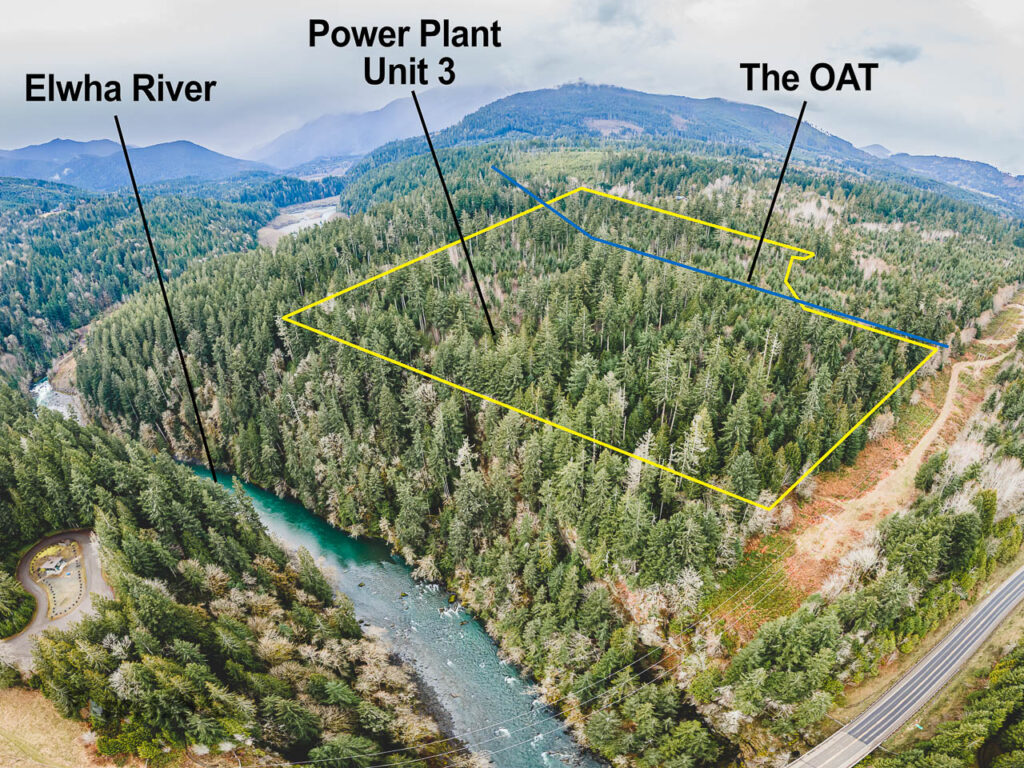
Over 200 acres are scheduled to be cut in 2023-2024 alone, including a timber sale of 126 acres called “Power Plant.”
If we’re serious about addressing the climate crisis and bringing back the natural abundance that used to be so characteristic of this watershed, meaningful protection of the remaining 850 acres of unprotected legacy forest left on state lands there is critical.
We know that mature and old-growth forests and large trees are the most important terrestrial carbon sink and that Pacific Northwest forests are essential for addressing climate change and preserving biodiversity. Yet we’re left battling a violent and unsustainable colonial system that incentivizes extraction over conservation.
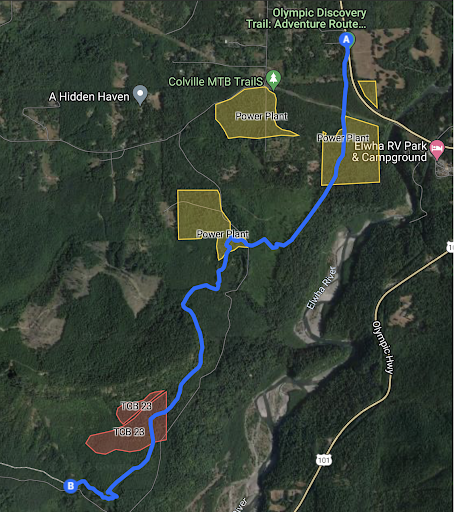
Washington passed the Climate Commitment Act in 2021 requiring the state to reduce 95% of carbon emissions by 2050. Protecting legacy forests on state lands could make a big contribution. The act also created a Natural Climate Solutions account, with a small amount of funding already flowing to protect legacy forests, but much more is needed.
Relying on the unique ability of Washington’s mature and legacy forests to sequester carbon is a win for everyone.
My place in this place:
Elizabeth: “As a resident of the Elwha River watershed for nearly a decade, I launched a local community engagement last year by inviting people to hike in an area of forest proposed to be logged in the ‘Aldwell’ timber sale. Despite significant opposition by the community and city of Port Angeles, the state auctioned Aldwell for logging. Since the Department of Natural Resources has continued teeing up forests in the watershed for logging, I led an effort to put together a recently filed lawsuit to challenge the Power Plant timber sale.
“I’m motivated to take action because I know we can’t replace 100-year-old trees in my lifetime. These trees will be old growth by the time my son is my age. You can’t make a new home for all the animals who live there. You can’t recreate complex forest ecosystems overnight. There’s no substitute. I know these forests like a good friend. I visit them and spend time with them. They give me so much. What do I have to give them? Everything I can to help them survive, so that they can continue to bring peace and joy to generations to come. The Elwha River needs these forests, and so do we.”
What this place needs:
Protection of this place will require educating the broader public about what’s at stake. We’re working tirelessly with community members and partners to raise awareness about logging in the Elwha River watershed and share the importance of legacy forests and how they are essential to the web of life.
Tillie Walton, a veteran river guide and award-winning documentary filmmaker, will also be telling the story of the Elwha River and its forests. She intends to film as she traverses the whitewater, allowing viewers to see and feel what she experiences — and what stands to be lost.
Protection of this place will also require bold legal action. On June 30 the Earth Law Center, along with the Center for Whale Research and the Keystone Species Alliance, filed a notice of appeal to challenge the upcoming Power Plant timber sale.
The community group Elwha Legacy Forests, of which Earth Law Center is a founding member, simultaneously launched a crowdfunding campaign to buy out the extractive timber harvest lease by replacing the funds that beneficiaries would otherwise receive from the harvest.
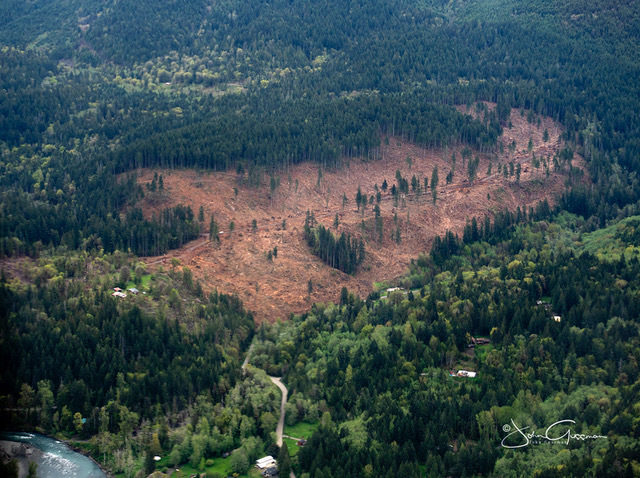
We need more scientists to explain why these forests play a critical role in the watershed’s health. And we need more wisdom keepers to awaken us to a relationship with these forests rooted in respect and reciprocity.
We also need new laws and policies. Earth Law Center is part of a coalition calling for Commissioner Franz to adopt a new mature forest policy and to place a moratorium on logging legacy forests until that policy is in place. We need more funding to complement and complete the Elwha River restoration by protecting all the watershed’s forests. And we need laws that fund essential services for rural communities without relying on extractive timber harvest dollars.
Who’s protecting it now:
The Earth Law Center, the Center for Whale Research, the Keystone Species Alliance, and the Elwha Legacy Forests community coalition are giving a voice to the Elwha forests through legal action and community outreach.
This spring more than 100 community members, largely from Port Angeles, the Lower Elwha Klallam Tribe, the Jamestown S’klallam Tribe, the Lummi Nation, and surrounding areas in the Olympic Peninsula, joined together in a peaceful rally at the Elwha River Observation Area near an active Aldwell timber harvest site. Although Aldwell was logged, we formed a lasting network of Elwha forest protectors.
The Port Angeles City Council has vocally opposed logging within the watershed until further study and discussion. In a June 1 letter, city manager Nathan West wrote to Franz to request delaying the Power Plant and another timber sale.
Lessons from the fight:
Our current system is rooted in an extractive mindset. As we move to a new paradigm, we need to be prepared to mobilize to provide urgent responses to the destruction of our natural world. This takes building a vast network of allies and drawing on all of our talents and passions — from artists, photographers, lawyers, scientists and more.
We know we are ready for this shift. Even though it might seem far, it is quite close. We’re at a tipping point.
Follow the fight:
Learn more about our work by visiting ELC’s Elwha Legacy Forests page, where you can also read about the importance of Pacific Northwest forests to combat climate change. Visit the Elwha Legacy Forests website to stay up to date, take action and see more photos of the forests we’re working to protect. Also check out ELC’s social media for updates on our case (Instagram, Facebook, Twitter, LinkedIn).
Previously in The Revelator:
The Elwha’s Living Laboratory: Lessons From the World’s Largest Dam-Removal Project
![]()

